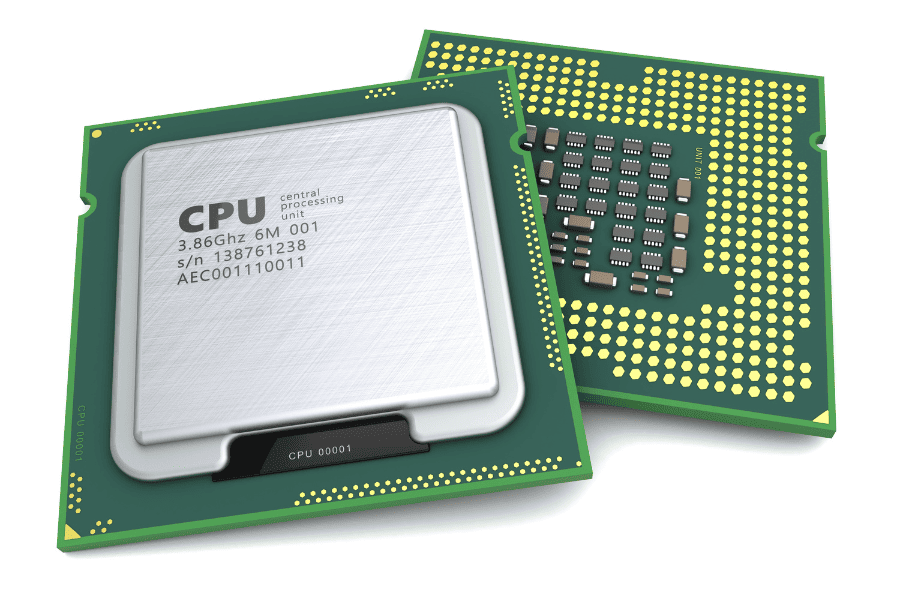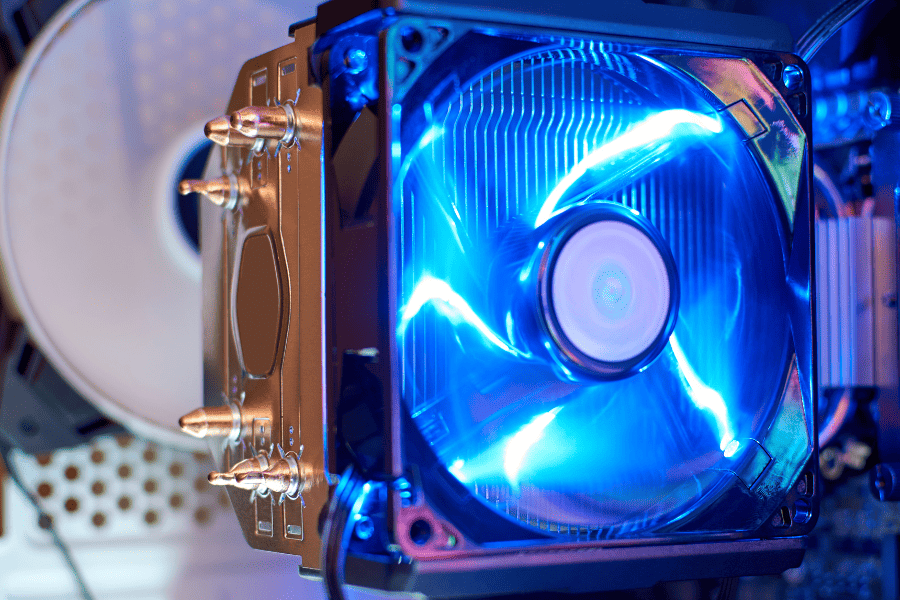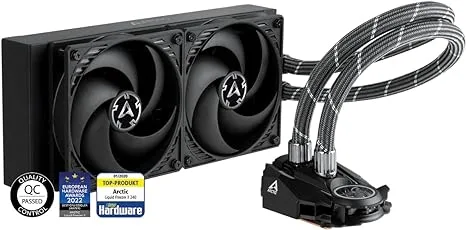Table of Contents
Introduction

Air Cooled CPU and Water Cooled CPU Systems. If you’re building a PC or looking to upgrade your current setup, one of the most important decisions you’ll face is choosing the right CPU cooling system. In this guide, we look at the two dominant cooling technologies on the market.
At the heart of every computer is the CPU (Central Processing Unit), a powerful component that executes the instructions of a computer program. Like any engine, the CPU generates heat during operation. Excessive heat can impede performance, shorten lifespan, and even risk hardware damage. Hence, a reliable cooling solution is not just an option; it’s an essential part of any healthy PC.
The cooling world might seem daunting with its jargon and technicalities, but fear not! Whether you’re a seasoned builder or a first-timer, we’re here to break down everything you need to know about “Air Cooled CPU” and “Water Cooled CPU” systems. We’ll explore how each system works, their pros and cons, and provide insights to help you decide which cooling method best suits your computing needs and lifestyle.
From the traditional, budget-friendly air coolers to the more advanced, efficient water cooling setups, each has its unique features and benefits. By the end of this guide, you’ll have a clearer understanding of both technologies, empowering you to make an informed choice for your beloved PC.
So, let’s dive in and demystify the world of CPU cooling systems!
Understanding CPU Cooling
Before we dive into the specifics of “Air Cooled CPU” and “Water Cooled CPU” systems, let’s understand the basics of CPU cooling and why it’s so crucial for your computer.
The Role of a CPU Cooler
The Central Processing Unit (CPU) is the brain of your computer, responsible for executing commands and running your operating system and applications. As it works, it generates heat. This isn’t just a byproduct; it’s a direct consequence of electrical energy being converted into computational power.
However, too much heat is detrimental. Excessive temperatures can lead to thermal throttling, where the CPU slows down to reduce heat generation, impacting performance. In extreme cases, overheating can cause permanent damage to the CPU and other components.
This is where CPU coolers come in. Their primary role is to dissipate this heat away from the CPU and maintain an optimal operating temperature. This ensures that your CPU runs efficiently, maintains its performance over time, and has a longer lifespan.
How Cooling Works
At its core, cooling a CPU involves transferring heat from the CPU to another medium, which then disperses it away from the hardware. The efficiency of this heat transfer and the subsequent dissipation are what determine the effectiveness of a cooling system.
In air cooling systems, this is achieved through a heatsink and fan. The heatsink, usually made of aluminum or copper, absorbs heat from the CPU. It has fins that increase its surface area, enhancing its ability to dissipate heat. A fan then blows air over these fins, carrying the heat away.
Water cooling, on the other hand, uses a liquid coolant to transfer heat. The coolant absorbs heat from the CPU as it passes through a water block. It then travels to a radiator where it releases the heat into the air, assisted by one or more fans. The cooled liquid is then recirculated back to the CPU, and the cycle continues.
The Importance of Effective Cooling
Effective cooling is not just about preventing damage; it’s about maintaining peak performance. Processors can run faster and more efficiently at lower temperatures, meaning better overall performance for your computer. Whether you’re gaming, editing video, or running complex simulations, effective cooling ensures that your CPU can handle demanding tasks without overheating.
In the next sections, we will explore “Air Cooled CPU” and “Water Cooled CPU” systems in detail, examining their mechanisms, advantages, and considerations to help you make the best choice for your PC setup.
Air Cooled CPU Systems: An Overview

In the realm of computer cooling, air-cooled systems stand as the cornerstone, known for their simplicity and reliability. The “Air Cooled CPU” approach is particularly popular among PC builders and users for various reasons. Let’s explore what air cooling is and how it benefits your computer.
What is an Air Cooled CPU System?
An Air Cooled CPU system is a method of dissipating heat from your computer’s CPU using air as the cooling medium. This system typically consists of a heatsink, which is a block of metal with fins or ridges, and one or more fans. The heatsink absorbs heat from the CPU and then the fans blow air over it, effectively reducing the temperature of the heatsink and, consequently, the CPU.
How Do Air Cooled Systems Work?
The working principle of an Air Cooled CPU is relatively straightforward:
- Heat Absorption: When your CPU operates, it generates heat. This heat is initially absorbed by the heatsink, which is in direct contact with the CPU.
- Heat Dissipation: The heatsink has a large surface area, thanks to its fins. This design helps to dissipate the absorbed heat more efficiently into the surrounding air.
- Airflow Management: Fans attached to the heatsink then create an airflow. This airflow moves the heat away from the heatsink, thereby cooling it down. As the heatsink cools, it can absorb more heat from the CPU, maintaining a cycle of heat transfer.
The Advantages of Air Cooling
Air-cooled systems are popular for several reasons:
- Simplicity and Reliability: These systems are straightforward in their design and operation, making them reliable and easy to maintain.
- Cost-Effectiveness: Generally, air coolers are more affordable than their water-cooled counterparts, making them a go-to choice for budget-conscious builders.
- Ease of Installation: Air coolers are typically easier to install, with fewer components than water cooling systems.
- Less Maintenance: They require minimal maintenance, mainly involving regular cleaning to remove dust.
Things to Consider
While air coolers are efficient, there are a few considerations to keep in mind:
- Size and Compatibility: Some air coolers can be quite large, so it’s important to ensure that the cooler you choose fits in your PC case and is compatible with your motherboard and RAM.
- Noise Levels: Fans can be noisy, especially under heavy load. However, many modern air coolers are designed to operate quietly.
- Aesthetic and Space: Air coolers might not have the same aesthetic appeal as some water coolers, and they can take up significant space within the case, potentially obstructing other components.
Conclusion
Air Cooled CPU systems offer an efficient, cost-effective, and user-friendly solution for the majority of PC users. Whether you’re a casual user, a gaming enthusiast, or someone who uses their PC for standard work tasks, an air cooling system can provide the necessary cooling performance to ensure your CPU runs smoothly and reliably.
Benefits and Limitations of Air Cooled CPUs
Air Cooled CPU systems are a popular choice for many computer users, ranging from casual users to gaming enthusiasts. Like any technology, they come with their own set of advantages and limitations. Understanding these can help you make an informed decision about whether an air cooling system is right for your PC.
Benefits of Air Cooled CPUs
- Cost-Effectiveness: One of the primary advantages of air coolers is their affordability. They are generally less expensive than water cooling systems, making them an attractive option for budget-conscious builders.
- Simplicity of Design and Use: Air coolers are straightforward in design and function. This simplicity translates to ease of installation and use, making them ideal for beginners in PC building.
- Reliability and Durability: With fewer moving parts than water cooling systems, air coolers are less prone to failure. This reliability is a key factor for users looking for a long-term cooling solution.
- Low Maintenance Requirements: Air coolers require minimal maintenance. Regular cleaning to remove dust and debris is usually sufficient to keep them functioning efficiently.
- No Risk of Leakage: Unlike water cooling systems, air coolers don’t carry the risk of liquid leakage, which can be detrimental to computer components.
- Good Performance for Standard Computing Needs: For most standard computing tasks, including moderate gaming, air coolers provide adequate cooling efficiency.
Limitations of Air Cooled CPUs
- Size and Space Consumption: Some air coolers can be bulky and may not fit in smaller PC cases. They can also interfere with the installation of other components, like RAM or additional fans.
- Aesthetics: Air coolers may lack the visual appeal of water cooling systems, which can be a consideration for users who prefer a certain look for their PC builds.
- Noise Levels: Fans in air coolers can generate noise, especially under heavy load. While modern air coolers are designed to be quieter, they may still be noticeable in a quiet environment.
- Limited Cooling Capacity in High-Performance Scenarios: While sufficient for most uses, air coolers may not be the best choice for extremely high-performance tasks, like overclocking or running highly demanding applications, where a water cooling system might be more effective.
Conclusion
Air Cooled CPUs offer a practical, cost-effective solution for a wide range of users. They are particularly suited for standard computing needs and for those who prefer a simpler, low-maintenance cooling option. However, for users with high-performance requirements or specific aesthetic preferences, the limitations of air coolers should be considered. Ultimately, the choice depends on individual needs, preferences, and the specific demands of your PC setup.
Discover More
As we wrap up our journey through the hidden layers of the internet, it’s clear that the digital world is vast and full of mysteries. But the exploration doesn’t have to stop here! If you’re intrigued by the complexities of the internet, you might also enjoy delving into these related topics
Laser Printers: The Alchemists of Modern Printing Magic – ReViewMaster DEN (rvmden.com)

Disclosure: As an Amazon Associate, I earn from qualifying purchases.
![You are currently viewing Air Cooled CPU vs Water Cooled CPU: Choose the right cooling system for PCs out of 2 [Part.1]](https://rvmden.com/wp-content/uploads/2024/01/Air-Cooled-CPU-vs.png)


